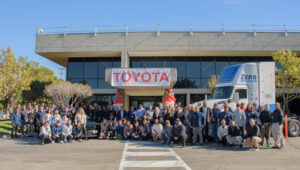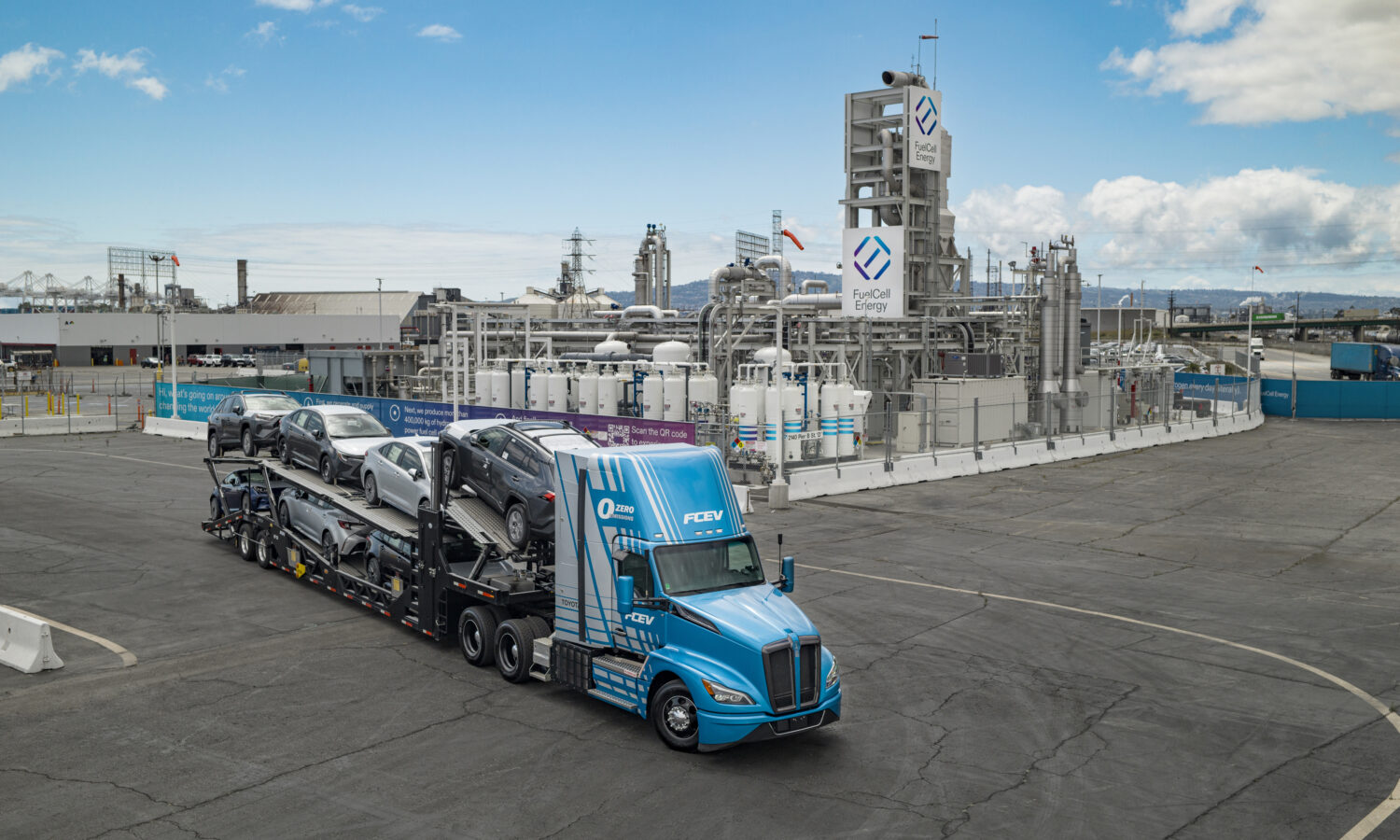
Toyota announces two new renewable energy steps in California
By onMarket Trends | Technology
Toyota Motor North America has announced two major renewable energy steps it is taking in California.
Toyota’s R&D office in Los Angeles County will be renamed the North America Hydrogen Headquarters (H2HQ), and the company will open a “Tri-gen” system. It will produce renewable electricity, renewable hydrogen, and usable water at the Port of Long Beach.
The company’s R&D office was recently redesigned to encompass teams working on research and development, commercialization planning, and sales of hydrogen-related products and technology, a Toyota press release says.
Toyota also plans to add a flexible microgrid and sustainable customer education center at the campus.
“Toyota has developed hydrogen fuel cell electric solutions for more than three decades, and we will continue to advance this scalable, zero-emission technology as part of our electrified portfolio,” said Ted Ogawa, Toyota Motor North America President and CEO, in a press release. “Renaming this facility as North American Hydrogen Headquarters represents our leadership in fuel cell development creating real-world products to help reduce carbon emissions.”
The company reorganized its hydrogen business in Japan to create a “Hydrogen Factory” last year. The factory brought all hydrogen-related work to one location. This was followed by Toyota Motor Europe creating a Hydrogen Factory to advance the company’s hydrogen business, the release says.
In North America, H2HQ will focus on North American-led initiatives to support the localization of hydrogen-related technologies and products. This includes light-duty fuel cell applications, heavy-duty fuel cell opportunities, stationary fuel cell power generation, port vehicle applications, and more.
The H2HQ facility includes the company’s largest dynamometer (1.2mw), a scalable test bench for stationary applications, and a hydrogen fueling station capable of providing fuel for both light- and heavy-duty vehicles, according to the release.
“I’m very pleased that Toyota is building on its longstanding commitment to California by locating its North American hydrogen headquarters here in the Golden State,” said California State Sen. Josh Newman (D-District 29), in the release. “The work done there, along with green hydrogen initiatives throughout the state, is propelling California toward a dynamic, clean-energy economy which will also reduce carbon emissions and foster environmental stewardship while extending California’s leadership in this important space.”
Toyota has started construction on a flexible microgrid that will utilize energy sources such as a 230-Kw solar photovoltaic system, a 1-mw stationary proton exchange membrane fuel cell generator, a 325-kW solid oxide fuel cell, and an on-site 500 kWh battery energy storage system, the release says. It adds that the microgrid will allow the campus to operate off-grid. It is projected to be fully operational by 2026.
In Toyota’s FuelCell Tri-gen system release, it says the system will use biogas to produce electricity, hydrogen, and water. It was built to support the vehicle processing and distribution center for Toyota Logistics Services (TLS) at Long Beach, which is the company’s largest vehicle processing facility in North America. The facility processes approximately 200,000 new Toyota and Lexus vehicles annually.
“The goal of our collaboration with FuelCell Energy was to find sustainable solutions for the TLS vehicle processing facility here at the Port of Long Beach as part of our goal to remove carbon dioxide emissions from our operations,” said Toyota Group Vice President of Sustainability and Regulatory Affairs Tom Stricker, in the release. “This groundbreaking facility shows that there are ways to reduce our emissions and burden on natural resources with scalable technology based on hydrogen.”
Long Beach is the company’s first port vehicle processing facility to be powered by 100% on-site generated renewable energy, the release says. FuelCell Energy’s fuel cell technology uses an electrochemical process that emits virtually no air pollutants, the release says. It is also highly efficient and combustion-free.
“Tri-gen demonstrates that hydrogen-based energy can benefit businesses, deliver zero-emission transportation for light- and heavy-duty vehicles, support improved air quality in local communities, reduce water usage, and deliver immediate and long-term benefits to the environment,” said FuelCell Energy CEO and President Jason Few, in the release. “As a company, we are living our purpose when we enable visionary customers like Toyota to decarbonize their operations and harness the energy solutions offered by hydrogen—all while leaving communities with cleaner air and easing the strain on power grids and water supplies.”
The system is capable of producing up to 1,200 kg per day of hydrogen, the release says. It will be used to fuel the needs of the company’s light-duty fuel cell electric vehicle (FCEV), the Mirai. It also will supply hydrogen to an adjacent heavy-duty hydrogen refueling station to support TLS logistics and drayage operations at the port.
As of Jan. 1, California’s Advanced Clean Fleet Regulation only allows zero-emission trucks to newly register as drayage trucks, the release says. By 2035, all drayage trucks will be required to be zero-emission.
“The Tri-gen platform supports FCEV Class 8 trucks today and is there to support ongoing migration to zero-emission trucks between now and 2035,’ the release says. “Hydrogen production can be ramped up and down based on demand. Since completing construction last year, in January of this year, Toyota used the renewable hydrogen produced at Tri-gen to fill the first Toyota Mirai vehicles at TLS, and in April the first heavy-duty FCEV Kenworth T680 Class 8 truck was filled at the adjacent Shell HD filling station using Tri-gen-produced renewable hydrogen.”
Water byproducts from hydrogen generation can produce up to 1,400 gallons of usable water per day, the release says. This is being repurposed for TLS car wash operations for vehicles that come into port before customer delivery.
“This helps reduce the demand on the constrained local water supplies by approximately half a million gallons per year,” the release says.
The release also claims the Tri-gen will reduce more than 9,000 tons of CO₂ emissions from the power grid each year.
“The dawn of the renewable hydrogen era is upon us, thanks to our collaboration with Toyota and FuelCell Energy and their innovative Tri-gen system,” said Port of Long Beach CEO Mario Cordero, in the release. “The green power generated by the Tri-gen system, and similar projects, is part of our multi-layered strategy to fuel our goal to become the world’s first zero-emissions Port.”
The release goes on to say that the system will avoid more than six tons of NOx emissions and reduce diesel consumption by more than 420,000 gallons per year.
Toyota’s research and development of hydrogen fuel cell technology spans more than 30 years and it currently holds more than 450 fuel cell technology patents in the U.S., according to the releases.
The company’s hydrogen cell research includes the launch of Toyota’s light-duty Mirai in 2015. The vehicle combines hydrogen with oxygen to generate power. The company also debuted a hydrogen-powered pickup truck prototype last year.
Both Hyundai and Bosch recently introduced visions for hydrogen energy at the 2024 Consumer Electronics Show in January.
Hyundai is expanding HTWO, a company brand, from a fuel cell system brand into a hydrogen value chain brand, a release said. The group will focus on developing end-to-end hydrogen solutions including production, storage, transportation, and utilization.
A Waste-To-Hydrogen program is focusing on the production of technology that turns waste and plastic into hydrogen, the release said.
Hyundai also announced last year that it’s partnering with the Georgia Institute of Technology to develop a hydrogen economy. In June, it announced the hiring of Jim Park to lead its North American hydrogen initiatives.
Bosch announced it is investing in technology along the entire hydrogen value chain, including its current production of a mobile fuel cell. Truck manufacturers in Europe, the U.S., and China have already placed orders, a press release said.
Both companies mentioned U.S. initiatives to support hydrogen, including a Biden administration announcement to invest $7 billion to support commercial-scale deployment of hydrogen.
California also passed a law in September to support $106 million in hydrogen infrastructure.
IMAGES
Feature photo of Toyota’s North America Hydrogen Headquarters, inside photo of Toyota’s Tri-gen systems/Toyota.

